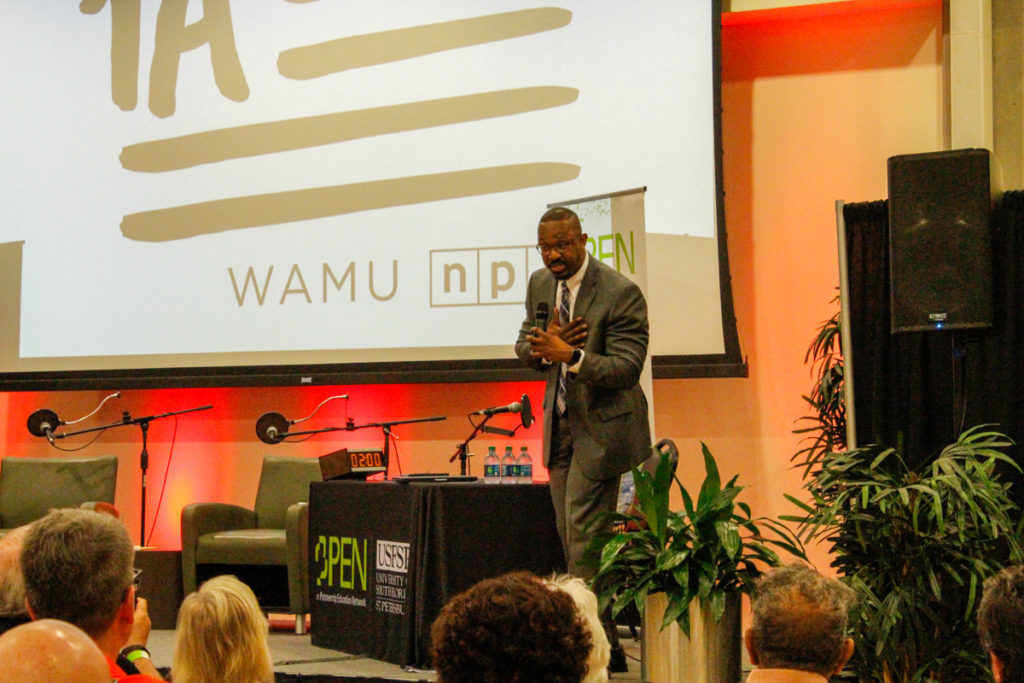
A Florida native from West Palm Beach, he “fell for public radio when (he) was 13.” From Miami to San Francisco, he’s worked in public radio for 15 years.
Dinorah Prevost | The Crow’s Nest
By Dinorah Prevost
Radio host Joshua Johnson, away from the microphone and pop filter, is not the droning radio newscaster you think of when you hear the letters N-P-R.
When Johnson tried to describe what a “civil dialogue” is like to a crowd in the University Student Center ballrooms, he let out a cartoonish howl of frustration.
That energy was characteristic of the host who taped his current events show “1A” live on campus Feb. 11.
The two-hour show was split into segments, the first one on fact-checking and the other on climate change.
For the hourlong fact-checking discussion, Johnson brought on USF Tampa professor Giovanni Luca Ciampaglia and the Poynter Institute’s Aaron Sharockman and Kelly McBride. Later on, for climate change, Mayor Rick Kriseman and two other Tampa professors, Rebecca Zarger and Don Chambers, joined him.
About 200 retirees and people packed the ballroom, and Johnson joked that they were “playing hooky from work and school.”
“We are a national program that, for 10 hours a week tries to create a space for Americans to have the kinds of conversations that are really tough to have,” Johnson said.
“Basically the whole country has been turned up to 11 (on a scale of 10) the past two years. What we try to do on ‘1A’ is at times bring the volume down so we can talk, but acknowledge why the volume is so high.”
“1A,” which stands for First Amendment, first aired in January 2017 and is nationally distributed. It replaced longtime talk show, the Diane Rehm Show, on WAMU in Washington, D.C.
“We knew that when Diane chose to retire after the 2016 election, that America was going to need a place to come talk, no matter who won,” Johnson said.
A Florida native from West Palm Beach, he “fell for public radio when (he) was 13.”
His mother listened to the Philadelphia-based station WRTI when it was a “news and jazz” station. Those types of stations had a higher black listenership than stations without jazz, he said.
“So my mother tuned in for the jazz and then she heard ‘Robert Seigel on ‘All Things Considered,’’” Johnson said.
Soon after, he started listening to NPR on his own.
“I grew up listening to Diane Rehm so I understood what her journalistic style was and her sense of civil dialogue,” he said.
He went to the University of Miami and worked in local TV broadcasting while in college. But he “got tired of local TV news and ran screaming into the arms of public radio.”
He did six years at Miami’s NPR affiliate WLRN and then landed at KQED in San Francisco for five years as a morning newscaster.
“I’ve been through hurricanes, election cycles, covered corruption scandals, the MTV Video Music Awards and Super Bowls,” Johnson said.
While Johnson was in California, WAMU began looking for a replacement for the then 80-year-old Rehm. Johnson was the last person to audition, and he got the gig.
At “1A,” Johnson said he tries not to be the know-it-all host, but a “learn-it-all” person.
“My job is much more about the human aspect of conversation than it is about knowing everything. I need to be a good listener, I need to be a good anthropologist or sociologist. And then know when to throw the script away. It’s a lot more… jazz journalism really,” he said.
For the fact-checking segment, click here. For the climate change segment, click here.



